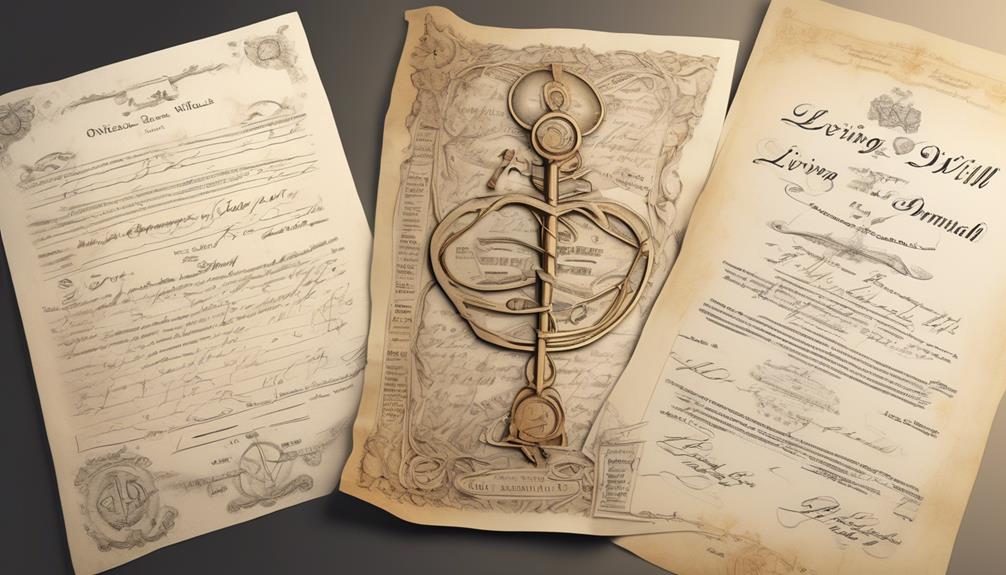Have you ever considered the fundamental distinctions between a living will and a last will and testament? Understanding the differences between these two legal documents is essential to ensure that your desires are executed accurately.
While a living will focuses on healthcare decisions during incapacity, a will deals with asset distribution post-mortem. These documents play vital roles in estate planning, providing clarity and guidance for both individuals and their families.
So, how do these documents impact your future decisions and the well-being of your loved ones? Let's explore this further together.
Key Takeaways
- Living will focuses on medical care during incapacity.
- Will primarily deals with asset distribution post-mortem.
- Both documents ensure wishes are honored and respected.
- Comprehensive estate planning includes both a will and a living will.
Living Will Vs Will: Understanding the Basics
When comparing a living will to a will, it's essential to understand the fundamental differences in their purposes and functions. A living will specifically addresses medical care preferences during serious illness or incapacity. This legal document guides healthcare decisions when an individual is unable to communicate their wishes regarding treatment.
On the other hand, a will focuses on asset distribution and appointing guardians for minor children or dependents after the individual's passing. In a will, beneficiaries are identified, and terms for the distribution of assets are outlined according to the individual's wishes.
The distinction between a living will and a will is crucial. While a living will pertains to healthcare decisions during life-threatening situations or incapacitation, a will deals with the distribution of assets and the appointment of guardians for dependents after death. Understanding these differences helps individuals ensure that their medical preferences and financial affairs are managed according to their desires.
Key Differences Between Living Will and Will

Moving from the comparison of a living will to a will, it's imperative to understand the key distinctions between these legal documents in healthcare and estate planning contexts.
A living will focuses on medical care preferences during incapacitation, directing healthcare decisions when individuals can't communicate. In contrast, a will primarily deals with asset distribution after death, determining beneficiaries and property allocation.
Living wills come into effect during life-threatening situations, while wills only take effect upon the testator's death. Specifically, living wills address end-of-life care and decisions regarding life-sustaining treatments.
On the other hand, wills manage estate distribution and may include provisions for guardianship, particularly for minor children. Both documents play critical roles in ensuring individuals' wishes are honored, with living wills guiding healthcare choices and wills overseeing the distribution of assets and responsibilities after one's passing.
Making Decisions: Living Will Vs Will
In considering the decision-making process between a living will and a will, individuals must understand the distinct roles each document plays in healthcare and estate planning. When making decisions about these legal documents, it's crucial to be well-informed about their implications for medical care and asset distribution.
- A living will focuses on healthcare decisions during serious illness or incapacity, guiding medical treatment preferences while the individual is alive.
- On the other hand, a will, also known as a last will and testament, directs asset distribution after death, outlining how property will be distributed among beneficiaries.
- The living will becomes effective when the individual is unable to communicate, ensuring their medical wishes are known and honored.
- Conversely, the will takes effect upon the individual's death, serving as a legal document for property distribution according to the individual's wishes.
Importance of Living Will and Will

Importance of having both a living will and a will can't be overstated, as these legal documents provide essential clarity and guidance for both medical and financial decisions. A living will is crucial for outlining preferences regarding medical care during serious illness or incapacity. It ensures that your personal wishes are known and respected, offering peace of mind during challenging times.
On the other hand, a will, also known as a last will and testament, is vital for directing the distribution of assets after death. By having both a living will and a will in place, you not only protect yourself during life but also safeguard your legacy for your loved ones after you pass away. These legal documents serve as a roadmap for your desires, offering clear instructions for your medical treatment and asset distribution, ultimately providing guidance for your future well-being and that of your heirs.
Choosing the Right Estate Plan: Will Vs Living Will
When crafting an estate plan, it's crucial to carefully consider the distinctions between a will and a living will to make informed decisions that align with your wishes and values.
Here are some key points to help you choose the right estate plan:
- Asset Distribution: A will dictates how your assets will be distributed after your death, while a living will focuses on guiding medical decisions in case of serious illness or incapacity.
- Executor: A will appoints an executor to manage the distribution of assets, whereas a living will typically includes directives for healthcare preferences and decisions.
- Legal Document: Both a will and a living will are legal documents serving distinct purposes. The will primarily deals with property matters, while the living will concentrates on healthcare choices.
- Comprehensive Estate Planning: To ensure your wishes are carried out in both asset distribution and medical care scenarios, it's essential to have both a will and a living will as part of your estate planning process.
Frequently Asked Questions
What Is One of the Main Disadvantages of a Living Will?
One main disadvantage of a living will is its limited applicability, as it only pertains to decisions while the individual is alive and incapacitated. This restriction hinders its ability to address post-death matters or asset distribution, creating gaps in comprehensive estate planning.
Additionally, the evolving nature of medical treatments may not always align with the directives in a living will, leading to uncertainty or conflicts in decision-making.
What Is Difference Between Living Will and Will?
When distinguishing between a living will and a will, it's crucial to understand that a living will pertains to healthcare decisions during incapacitation, while a will focuses on asset distribution after death.
The activation timing varies, with a living will being effective during incapacity and a will taking effect posthumously.
These legal documents each play distinct roles in addressing medical care and property matters, ensuring our wishes are honored during life and after.
What Is the Main Purpose of a Living Will?
The main purpose of a living will is to ensure that our medical treatment preferences are known and honored in case we can't communicate. It guides healthcare decisions about life-sustaining treatments and end-of-life care, like medication, life support, and extraordinary measures.
What Is Another Name for a Living Will?
Another name for a Living Will is an Advance Directive for Healthcare.
It's a crucial legal document that expresses medical treatment preferences when we can't communicate our wishes.
It ensures our healthcare choices are honored during terminal illness or incapacity.
This document plays a vital role in guiding healthcare decisions and ensuring our desires are respected by both medical professionals and our loved ones.
Conclusion
In conclusion, it's crucial to have both a living will and a will in place to ensure your wishes are followed during incapacity and after death.
Did you know that only 32% of Americans have a living will?
Imagine the peace of mind knowing that your medical care preferences are documented and your assets are distributed according to your wishes.
Don't wait, take the necessary steps to create a comprehensive estate plan today.









